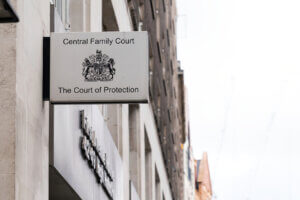Who gets the house in a divorce?

Contact
Table of Contents
How is a house divided in a UK divorce?
For most people thinking about getting a divorce, one of the main concerns will be what happens to the family home. You may be worried about where you and your children will live or if you could be forced to sell your much-loved home.
You have many options when deciding what happens to the house after a divorce. This could include:
- Buying your spouse out of their share of the home;
- Selling the home; or
- Postponing a sale until your children are older.
Depending on the value of any other assets, it may also be possible to offset one person’s interest in the home against another asset. For example, perhaps one of you will keep the family home in exchange for the other keeping a pension fund or holiday home.
There may be other property that needs to be considered in any divorce financial settlement, such as inherited property, buy-to-let property, or a holiday home.
Any property you are interested in, own in your sole name, or own jointly with your spouse must be disclosed. You must also disclose any interest in assets jointly owned with someone outside of the marriage.
Once full and frank disclosure has been made (by both parties), we will advise you on which assets will be taken into account for division. Full and frank disclosure is necessary as you must know what is in the pot before dividing it.
Generally speaking, any assets you have acquired or built up during your marriage will be considered ‘matrimonial property’ and considered for division. If a property is owned by you and someone other than your spouse, it is only your share in that asset that will be considered.
The house you and your spouse use as your main residence will certainly be considered ‘matrimonial property’ as it is the family home. This is the case regardless of who paid the deposit or the mortgage.
If you entered a prenuptial agreement, it is important to provide this document when we meet. We will check if it covers all property and that there have been no material changes since the prenuptial agreement was signed, which could impact its implementation.
Our experienced family law solicitors answer some of our clients’ frequently asked questions regarding their property portfolios if there is no prenuptial agreement.
Are there circumstances when the family home isn’t split equally?
The starting point in any divorce is that the family home should be divided equally, but there are several circumstances when this may not occur. For example, if one spouse:
- continues to live in the house with young children of the family;
- needs a larger share of the sale proceeds to rehouse the children;
- has a disability and therefore a greater need for housing provision;
- contributed significantly more to the deposit and mortgage than the other person, and the marriage was a very short.
Before knowing how the house will likely be divided, we will need to value your home. We have a network of experienced valuers and can select the one most appropriate for your property type and location. Once we receive the valuation and full disclosure of all assets you and your spouse own, we will advise you on what is likely to happen to the matrimonial home.
If you wish to retain the family home, then we can advise you on your options, which may include:
- raising a lump sum of money to buy out your spouse’s interest;
- giving up an entitlement to a different matrimonial asset, such as your spouse’s pension, in exchange for obtaining the home by way of an offset; or
- mesher order whereby the house is sold later and then the proceeds are divided.
Who gets the house in a divorce with children?
There is no general rule over who will typically keep the family home with children. The court must take into account several factors when deciding this, including:
- The needs and arrangements for children;
- The age, health and earning capacity of each spouse;
- The assets and available resources;
- What each spouse needs;
- The length of the marriage and what each spouse contributed;
- The standard of living of each spouse; and
- Any negative conduct that would be inequitable for a court to ignore.
The first consideration for the court will always be the housing needs of the children. We can advise you on your rights, which can be especially important if the family home is not held in your name.
What is matrimonial property?
Matrimonial property usually includes the family home and other assets acquired or brought into the marriage by a spouse, such as holiday homes, investment properties, savings, investments, cars, boats, art collection etc.
It can also include your pension that has been accumulated during the course of the marriage.
An argument can arise regarding what is defined as matrimonial property and some property may be excluded from the ‘marital pot” such as pre-marital property or an inheritance.
Do I lose my rights if I move out of the family home?
No. If you decide you can no longer live in the former family home, you can rest assured that moving out will not take away your rights over the property.
In some circumstances, moving out is the sensible thing to do to protect your mental health. It can even benefit relations in the long run, especially where children are involved, as you may be protecting your children from witnessing parents’ arguments.
If you leave the home, we recommend taking your personal possessions and financial records with you. Despite still having a legal interest in the home, we recommend you do not return unannounced. It is best to make arrangements with your spouse if you must return for any reason.
You may need to move out to escape if you have suffered domestic abuse. In these circumstances, you should seek urgent legal advice as it may be possible to obtain a court order removing your spouse from the home instead of you having to leave.
What if the property is not owned in joint names?
When two people own property together, they choose two ownership structures: joint tenancy or tenancy in common. Most married couples own their family home as joint tenants because of the right of survivorship, which means that if one of you dies, your share automatically passes to the other with no need for a will to set this out. If you decide to divorce or separate, many people don’t want the whole property to pass to their now ex-partner when they die. This is known as severance of joint tenancy, which means converting the joint tenancy into a tenancy in common.
If your spouse owns the property in their sole name, it does not impact both of you still having a legal interest in the house but you must seek urgent legal advice to ensure your interest can be protected. We can take steps to register your interest with the Land Registry to prevent your spouse from selling, transferring or remortgaging the house without your knowledge.
Does my spouse have rights to the property after the divorce?
Divorce does not end a spouse’s rights to property even if you have agreed between yourselves who will get what. You must have a consent order to ensure that your spouse cannot return years later and make a claim over your property. This is an order from the court formalising the agreement between you and your spouse.
If you cannot agree with your spouse, you must apply to the court for a judge to determine how the matrimonial assets should be divided. A judge’s determination will also ensure that your spouse does not have rights to the property after your divorce is finalised.
What happens to inherited property in a divorce?
This will depend on several factors, including when the property was received, how it has been used, whether it has been mixed and what the needs of each spouse are compared to what other matrimonial assets are available. Please visit our inherited wealth page for more information.
What happens to investment properties in a divorce?
An investment property is treated the same as any other asset. A determination will initially be made as to if it is matrimonial property or not. If it is deemed matrimonial property, regardless of whose name the property is held in, it will be considered part and parcel of the matrimonial pot to be divided between spouses.
What happens to a holiday home in a divorce?
Holiday homes will be taken into account if they are deemed to be matrimonial property. If your holiday home is within the UK then the court can make an order for its sale or transfer.
If your holiday home is overseas, it is still possible for the court to make an order for its sale or transfer. However, if this is not done, enforcing the court order in a foreign jurisdiction can be a complex task. If you find yourself in this situation, you must obtain early legal advice.
How can we resolve our divorce property dispute?
Firstly, an agreement should be reached to ensure any mortgage is paid and building insurance is covered. You do not want to risk losing the house, or your share in its value, to a repossession or uninsured property damage.
Next, once you and your spouse have made full and frank financial disclosures, we can advise you on what will likely happen to the family home. At this stage, it is wise to try and reach an agreement with your spouse, either directly, with the help of a mediator or via solicitors. If an agreement can be reached, we will draft the agreement in a deed of separation and/or consent order.
If an agreement cannot be reached after mediation, we can represent you in court proceedings.
When is a deed of trust helpful?
Deciding if/when to sell the family home is frequently a major issue to resolve.
One option is to agree to continue to own the property for a period of time, say, until the children have finished school. This arrangement is often reflected in a Declaration of Trust. It is important to set out the terms of that continued ownership and occupation legally bindingly for both parties. Some initial considerations concerning this arrangement are set out below.
The Trust Property Deed would cover matters such as:
- The choice and location of the property and defining the type of property to be purchased.
- Who pays the purchase costs?
- Who the trustees are, their charges and the mechanism for changing them.
- Is there a provision for an alternative replacement property to be purchased if the Occupying Parent (OP) wanted to move?
- Terms of occupation.
- Dealing with a change of circumstances (for example, whether a sale is triggered if the OP remarries or cohabits or the child moves to live with the other parent).
- Who pays for external and internal repairs and decoration?
- Who pays any mortgage, service charges and ground rent?
- Who pays insurance and tax expenses?
- Who pays the utilities, Council tax, internet?
- Whether the OP should provide an account of expenditure.
- Whether the OP can buy the other parent out at the end of the term
The creation of a Trust property gives rise to tax and therefore it is important that clients have that advice early on, to factor that into their financial discussions.
How Osbornes can help?
When it comes to considering your property on divorce it is essential that you obtain early expert legal advice. Our expert London-based divorce lawyers have experience in representing and advising clients on all aspects of how to get a divorce including the division of the family home.
If you are overseas or outside London, we have high-speed video conferencing facilities and a full online service to ensure you are kept up-to-date and fully appraised of your case and legal options.
Find out more about:
- pensions and divorce
- divorce and trusts
- business assets and divorce
- Can I protect my inheritance from my spouse?
Share this article
Insights about Divorce Financial SettlementsVIEW ALL
- 4.7.2025
Standish Ruling: What Counts as Matrimonial Property
Supreme Court confirms only a valuable asset treated by parties as a matrimonial asset has been ‘matrimonialised’ The financial remedies...
Read more - 17.3.2025
Selling a House in Divorce
A guide to amicably selling a house during divorce One of the biggest issues in divorce is what happens to...
Read more - 24.2.2025
How Are Finances Divided On Divorce?
Avoiding Misconceptions: How Are Finances Divided On Divorce? The financial remedies team at Osbornes Law advises divorcing clients across London...
Read more - 21.2.2025
Protecting Business Privacy in Divorce Financial Proceedings
Business owners: protecting privacy of confidential information in financial proceedings on divorce We represent many business-owners in financial proceedings on...
Read more - 4.11.2024
Anglo-French Divorce: Jurisdiction Guide
Anglo-French Divorce: which jurisdiction is right for you? It has been a year since we launched our Anglo-French department in...
Read more - 29.10.2024
Economic Disadvantage in Divorce: Can You Be Compensated?
Giving Up High Earnings: Can A Party Be Compensated For Economic Disadvantage? In financial remedies cases, the fact that one...
Read more - 24.10.2024
Can a Declaration of Trust Stand in Matrimonial...
Matrimonial Homes: Can A Declaration Of Trust Of Beneficial Ownership Stand? Resolving issues relating to ownership of the former matrimonial...
Read more - 23.10.2024
When Abusive Behaviour Affects Divorce Financial Relief
When is Abusive Behaviour Relevant To Financial Relief on Divorce? Domestic violence and other abusive behaviours are a contributing factor...
Read more - 25.9.2024
What Happens to Savings & Investments in Divorce?
Divorce often raises important questions about the division of assets, particularly savings and investments. Understanding what happens to these financial...
Read more - 23.9.2024
International footballer fails to comply with financial disclosure
UD v TQ: The importance of complying with financial disclosure Recent divorce case involving an unnamed international footballer is a...
Read more - 20.9.2024
Pension Attachment Order: A guide
Pensions are quite often valuable assets in a marriage. In some cases, they can be worth more than the family...
Read more - 27.8.2024
Pension Sharing Orders
Pension Sharing in Divorce With so many things to consider when dividing up your finances during a divorce or dissolution...
Read more - 20.8.2024
What is pension offsetting?
In this article, we will explore the concept of pension offsetting and how it can play a crucial role in...
Read more - 12.8.2024
NA v LA [2024] EWFC 113: Judge Orders Non-Court Dispute...
Financial Claims: Judges Can Order Parties To Attempt Non-Court Dispute Resolution As was expected, the court has been quick to...
Read more - 1.8.2024
Standish v Standish: Court of Appeal Decision on...
Court of Appeal reduces wife’s divorce award by £20million Dealing with financial matters on divorce can be complex. And...
Read more - 1.8.2024
Matrimonial vs Non-Matrimonial Assets
Matrimonial vs Non-Matrimonial Assets in Divorce During a divorce, people often make the mistake of assuming that everything they own...
Read more - 1.8.2024
What is a Periodical Payments Order?
Periodical Payments Orders in Divorce Throughout the process of a divorce or when unmarried couples with children split up, numerous...
Read more - 1.8.2024
What is a Lump Sum Order?
A lump sum order is a crucial element of divorce settlements that can significantly impact the financial future of both...
Read more - 25.7.2024
What is a Property Adjustment Order?
A property adjustment order is a key legal mechanism used during a divorce to fairly divide property and assets between...
Read more - 14.6.2024
What Happens If You Have a Joint Mortgage...
Understanding whether you can keep a joint mortgage after divorce is crucial, especially if both parties are still liable for...
Read more - 10.6.2024
What is Financial Disclosure in Divorce?
Introduction to divorce financial disclosure A divorce ends your marriage but it doesn’t end your financial ties to your...
Read more - 7.6.2024
What is a Clean Break Order?
In this article, we will explore the concept of a clean break order, examining its advantages and disadvantages. We will...
Read more - 6.6.2024
Court reduces Wife’s award by £20 million
The biggest “Divorce Cut” in legal history Court of Appeal judges have just made history by reducing the divorce award...
Read more - 28.5.2024
Short-term marriage divorce settlements
A Marriage is a Marriage — Even if it’s short and childless When deciding who gets what in a divorce,...
Read more


























